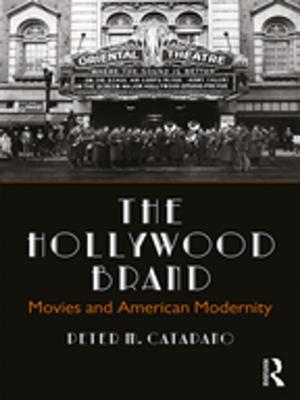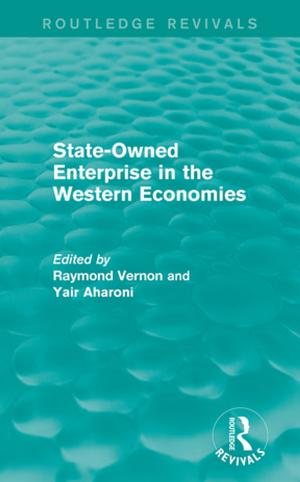Puerto Rican Discourse
A Sociolinguistic Study of A New York Suburb
Nonfiction, Reference & Language, Language Arts, Communication, Social & Cultural Studies, Social Science| Author: | Lourdes M. Torres | ISBN: | 9781136687891 |
| Publisher: | Taylor and Francis | Publication: | December 2, 2013 |
| Imprint: | Routledge | Language: | English |
| Author: | Lourdes M. Torres |
| ISBN: | 9781136687891 |
| Publisher: | Taylor and Francis |
| Publication: | December 2, 2013 |
| Imprint: | Routledge |
| Language: | English |
Before conclusions about Spanish in the United States can be drawn, individual communities must be studied in their own contexts. That is the goal of Puerto Rican Discourse. One tendency of previous work on Spanish in the United States has been an eagerness to generalize the findings of isolated studies to all Latino communities, but the specific sociocultural contexts in which people -- and languages -- live often demand very different conclusions. The results of Torres' work indicate that the Spanish of Puerto Ricans living in Brentwood continues to survive in a restricted context. Across the population of Brentwood -- for Puerto Ricans of all ages and language proficiencies -- the Spanish language continues to assume an important practical, symbolic, and affective role.
An examination of the structural features of 60 oral narratives -- narrative components and the verbal tenses associated with each, overall Spanish verb use, and clause complexity -- reveals little evidence of the simplification and loss across generations found in other studies of Spanish in the United States. English-dominant Puerto Ricans are able Spanish language narrators demonstrating a wide variety of storytelling skills. The structure of their oral narratives is as complete and rich as the narratives of Spanish-dominant speakers.
The content of these oral narratives of personal experience is also explored. Too often in studies on U.S. Spanish, sociolinguists ignore the words of the community; the focus is usually on the grammatical aspects of language use and rarely on the message conveyed. In this study, oral narratives are analyzed as constructions of gendered and ethnically marked identities. The stories demonstrate the contradictory positions in which many Puerto Ricans find themselves in the United States. All of the speakers in this study have internalized, to a greater or lesser extent, dominant ideologies of gender, ethnicity, and language, at the same time that they struggle against such discourse. The analysis of the discourse of the community reveals how the status quo is both reproduced and resisted in the members' narratives, and how ideological forces work with other factors, such as attitudes, to influence the choices speakers make concerning language use. A special feature of this book is that transcripts are provided in both Spanish and English.
This volume combines ethnographic, quantitative, and qualitative discourse methodologies to provide a comprehensive and novel analysis of language use and attitudes of the Brentwood Puerto Rican community. Its rich linguistic and ethnographic data will be of interest to researchers and teachers in cultural communication, ethnic (Hispanic-American) studies, sociolinguistics, and TESL.
Before conclusions about Spanish in the United States can be drawn, individual communities must be studied in their own contexts. That is the goal of Puerto Rican Discourse. One tendency of previous work on Spanish in the United States has been an eagerness to generalize the findings of isolated studies to all Latino communities, but the specific sociocultural contexts in which people -- and languages -- live often demand very different conclusions. The results of Torres' work indicate that the Spanish of Puerto Ricans living in Brentwood continues to survive in a restricted context. Across the population of Brentwood -- for Puerto Ricans of all ages and language proficiencies -- the Spanish language continues to assume an important practical, symbolic, and affective role.
An examination of the structural features of 60 oral narratives -- narrative components and the verbal tenses associated with each, overall Spanish verb use, and clause complexity -- reveals little evidence of the simplification and loss across generations found in other studies of Spanish in the United States. English-dominant Puerto Ricans are able Spanish language narrators demonstrating a wide variety of storytelling skills. The structure of their oral narratives is as complete and rich as the narratives of Spanish-dominant speakers.
The content of these oral narratives of personal experience is also explored. Too often in studies on U.S. Spanish, sociolinguists ignore the words of the community; the focus is usually on the grammatical aspects of language use and rarely on the message conveyed. In this study, oral narratives are analyzed as constructions of gendered and ethnically marked identities. The stories demonstrate the contradictory positions in which many Puerto Ricans find themselves in the United States. All of the speakers in this study have internalized, to a greater or lesser extent, dominant ideologies of gender, ethnicity, and language, at the same time that they struggle against such discourse. The analysis of the discourse of the community reveals how the status quo is both reproduced and resisted in the members' narratives, and how ideological forces work with other factors, such as attitudes, to influence the choices speakers make concerning language use. A special feature of this book is that transcripts are provided in both Spanish and English.
This volume combines ethnographic, quantitative, and qualitative discourse methodologies to provide a comprehensive and novel analysis of language use and attitudes of the Brentwood Puerto Rican community. Its rich linguistic and ethnographic data will be of interest to researchers and teachers in cultural communication, ethnic (Hispanic-American) studies, sociolinguistics, and TESL.















